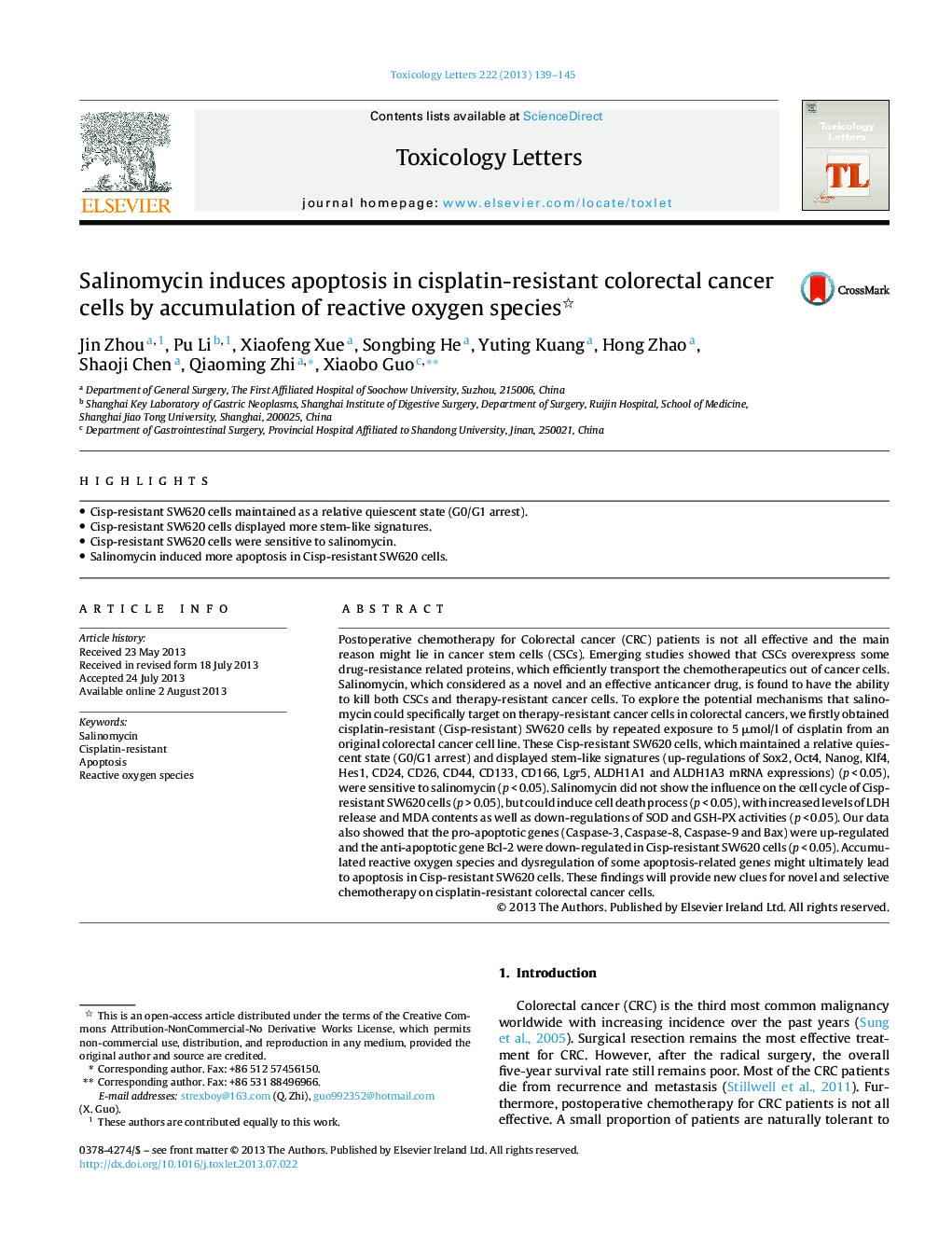| کد مقاله | کد نشریه | سال انتشار | مقاله انگلیسی | نسخه تمام متن |
|---|---|---|---|---|
| 5860538 | 1133190 | 2013 | 7 صفحه PDF | دانلود رایگان |
عنوان انگلیسی مقاله ISI
Salinomycin induces apoptosis in cisplatin-resistant colorectal cancer cells by accumulation of reactive oxygen species
ترجمه فارسی عنوان
سالینومایسین آپوپتوز را در سلول های سرطانی مقاوم به سیس پلاتین ایجاد می کند با انباشت گونه های اکسیژن واکنشی
دانلود مقاله + سفارش ترجمه
دانلود مقاله ISI انگلیسی
رایگان برای ایرانیان
کلمات کلیدی
سالینومایسین، مقاوم در برابر سیس پلاتین، آپوپتوز گونه های اکسیژن واکنش پذیر،
موضوعات مرتبط
علوم زیستی و بیوفناوری
علوم محیط زیست
بهداشت، سم شناسی و جهش زایی
چکیده انگلیسی
Postoperative chemotherapy for Colorectal cancer (CRC) patients is not all effective and the main reason might lie in cancer stem cells (CSCs). Emerging studies showed that CSCs overexpress some drug-resistance related proteins, which efficiently transport the chemotherapeutics out of cancer cells. Salinomycin, which considered as a novel and an effective anticancer drug, is found to have the ability to kill both CSCs and therapy-resistant cancer cells. To explore the potential mechanisms that salinomycin could specifically target on therapy-resistant cancer cells in colorectal cancers, we firstly obtained cisplatin-resistant (Cisp-resistant) SW620 cells by repeated exposure to 5 μmol/l of cisplatin from an original colorectal cancer cell line. These Cisp-resistant SW620 cells, which maintained a relative quiescent state (G0/G1 arrest) and displayed stem-like signatures (up-regulations of Sox2, Oct4, Nanog, Klf4, Hes1, CD24, CD26, CD44, CD133, CD166, Lgr5, ALDH1A1 and ALDH1A3 mRNA expressions) (p < 0.05), were sensitive to salinomycin (p < 0.05). Salinomycin did not show the influence on the cell cycle of Cisp-resistant SW620 cells (p > 0.05), but could induce cell death process (p < 0.05), with increased levels of LDH release and MDA contents as well as down-regulations of SOD and GSH-PX activities (p < 0.05). Our data also showed that the pro-apoptotic genes (Caspase-3, Caspase-8, Caspase-9 and Bax) were up-regulated and the anti-apoptotic gene Bcl-2 were down-regulated in Cisp-resistant SW620 cells (p < 0.05). Accumulated reactive oxygen species and dysregulation of some apoptosis-related genes might ultimately lead to apoptosis in Cisp-resistant SW620 cells. These findings will provide new clues for novel and selective chemotherapy on cisplatin-resistant colorectal cancer cells.
ناشر
Database: Elsevier - ScienceDirect (ساینس دایرکت)
Journal: Toxicology Letters - Volume 222, Issue 2, 24 October 2013, Pages 139-145
Journal: Toxicology Letters - Volume 222, Issue 2, 24 October 2013, Pages 139-145
نویسندگان
Jin Zhou, Pu Li, Xiaofeng Xue, Songbing He, Yuting Kuang, Hong Zhao, Shaoji Chen, Qiaoming Zhi, Xiaobo Guo,
